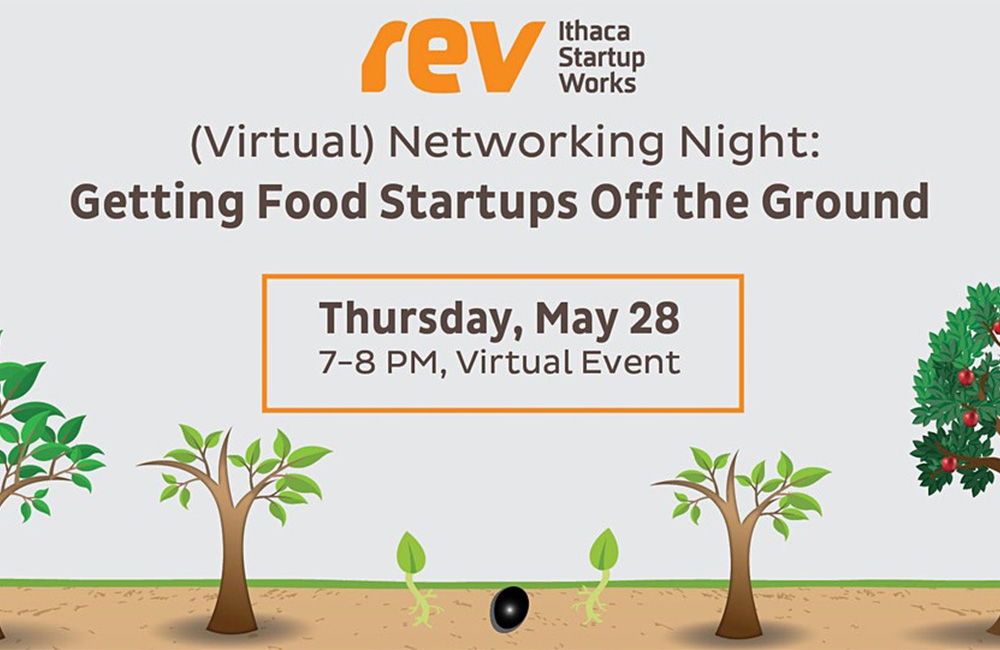
Rev Holds First Virtual Networking Night
Networking is essential for a number of professionals, but perhaps especially so for entrepreneurs. That’s why, even in the time of COVID-19, Rev is carrying on its Networking Nights, virtually. Its first since the onset of the pandemic, “Getting Food Startups Off the Ground” was attended by approximately 60 participants interested in making connections in the food and agriculture innovation spaces.
The networking portion of the night was achieved by sorting food and ag entrepreneurs into Zoom break-out rooms, each moderated by one of Rev’s Entrepreneurs-in-Residence. There, attendees engaged with one another, as well as with business experts in Rev’s entrepreneurial ecosystem, discussing emerging technology, price per pound of products, and exchanging ideas for uses of by-products, among other topics. Participants may have been sitting many miles apart on their home computers, but they were able to forge valuable connections to further their businesses.
During the event, Rev also connected startup founders with local resources, many of which are committed to the growth of entrepreneurship in New York. A recent CB Insights report ranked New York State second in the nation in ability to attract venture capital investments in the food, beverage, and agriculture sectors, according to Kathryn Boor, the Ronald P. Lynch Dean of Cornell University’s College of Agriculture and Life Sciences (CALS).
Boor extolled the many virtues of New York as a food-producing state to Networking Night attendees, pointing to the 112 million eaters residing along the eastern seaboard and the state’s abundance of water whereas others are plagued with drought. According to Boor, venture capitalists invest hundreds of millions of dollars in New York’s food, beverage, and agriculture sectors.
Attendees learned about the many entrepreneurial resources Cornell University has to offer food startups. “CALS supports innovation and entrepreneurship across our local and regional food systems,” said Boor. Aside from educating its students and facilitating them to become expert food producers, CALS also houses or supports initiatives that are open to non-students.
The Center of Excellence for Food and Agriculture (COE) leverages the world-class research and expertise of Cornell University to accelerate growth and position New York State as a global leader in food and agricultural advancement. It encourages food entrepreneurs to establish or grow their businesses in New York, connecting them with innovation resources and economic development partners. The COE provides business mentoring, technical assistance, research, business-to-business partnerships, supply chains, and myriad other resources, including how to market and diversify during the pandemic, that companies need to succeed and thrive.
The Cornell Food Venture Center at Cornell Agritech (CVFC) is a 10,000 sq. ft. recognized Processing Authority in Geneva, NY with expertise in all aspects of food safety and regulatory compliance. “It’s the best playground for food nerds in the country,” said Bruno Xavier, Senior Extension Associate and Processing Authority at the CFVC, adding, “I like to summarize our mission by saying that food safety and technology are not impediments to starting a food business here. We want the field to be level for large and small companies alike.”
Through the CFVC, entrepreneurs have access to its pilot plant, vinification and brewing technology laboratory, food processing and development laboratory, and dairy pilot plant. The facilities are available on an hourly basis for product development under CFVC guidance. Some of the services entrepreneurs may receive through the Center are business development, connections to co-packers, and training on food safety protocols, such as ensuring products are cooked to a certain temperature.
Xavier also expressed a sign of hope for food startups amid the wide-scale disruption caused by the COVID-19 pandemic. “This crisis is extremely important for the food industry. It means huge changes,” he said. While large food companies with 50-60 suppliers are struggling to remain operational when COVID-19 cases emerge among their employees or their suppliers’ employees, small companies can react much more quickly. Xavier sited one CFVC business which has adapted during the coronavirus outbreak so that what used to be its by-product now makes up 60% of its revenue.
A friend who is an investment banker recently gave Xavier an additional sliver of hope for the food industry, noting that food is one of the few sectors still looking positive for investors. The funds won’t dry up, said the friend, food investors are just looking for better ideas.
Entrepreneurs can get additional support from Grow-NY, a business competition which attracts innovative, high-growth food and agriculture startups from across the globe and engages them in the region’s rapidly-growing startup ecosystem. Up to 20 finalists are matched with experienced mentors and receive customized business development trips to the region. The competition awards $3 million each year to seven startups, with a top prize of $1 million. Grow-NY’s 2020 application deadline is July 15.
Entrepreneurs who attended the Rev Networking Night on May 28 (as well as those who did not) are encouraged to email [email protected] with any requests for future Networking Night topics.
